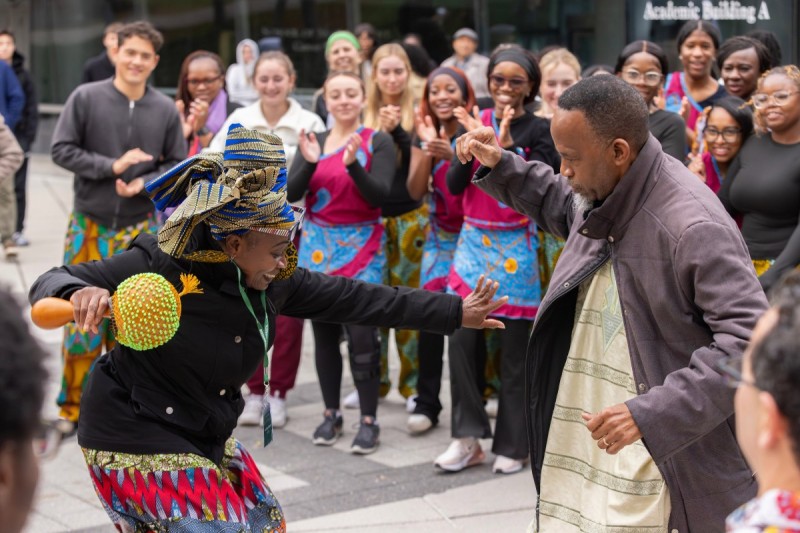Exploring the New African Diaspora: Culture, Identity, and the Third Culture Phenomenon
Change and possibility flourish at intersections and borderlands — but so do tensions and profound questions about belonging and identity. This complexity is vividly captured in the emerging “Third Culture,” a term that encapsulates the experiences of children born to post-colonial African and Caribbean immigrants. These individuals live at the crossroads of cultures, presenting a unique chance to redefine what it means to be Black in contemporary society.
The Third Culture Concept
The term “Third Culture,” introduced by researchers John and Ruth Useem in the 1950s, originally referred to the children of expatriates, military diplomats, and international workers. It described a distinct cultural space formed by those who live abroad, blending aspects of their parents’ heritage with the culture that surrounds them. At the Binghamton University Department of Africana Studies’ recent conference, titled “The New African Diaspora: Intersections of Culture, Race and Identity,” scholars delved deep into this concept, applying it to children of African and Caribbean immigrants who navigate between their ancestral roots and the cultures of their new homes.
Conference Highlights
Held in October and funded by the Andrew W. Mellon Foundation, the Binghamton conference featured an array of keynotes and panels that examined the nuances of cultural intersections. Notable speakers included Binghamton University Distinguished Professor Nkiru Nzegwu, celebrated fantasy writer Nnedi Okorafor, and SUNY Oswego’s President Peter Nwosu. The event opened with Kpanlogo, a traditional Ghanaian dance, emphasizing the importance of cultural expression. Samuel Elikem Nyuamuame, Assistant Professor of Theater and Africana Studies, coordinated the performance, highlighting the role of traditional art forms in cultural identity.
Culture, Race, and Identity
Africana Studies Chair and Professor Titilayo Okoror articulated the conference’s foundational theme: culture is what we carry with us, race is often imposed upon us in new environments, and identity is a personal choice shaped by our experiences. This idea resonates deeply with the Third Culture concept, as individuals navigate their identities amid cultural diversity and sometimes conflicting expectations.
Creative Contributions of the Third Culture
The rise of Third Culture individuals is marked by their professional accomplishments across various fields, including academia, law, medicine, and public health. Additionally, they are pivotal in shaping contemporary culture through the booming popularity of Afrobeats and the growing prominence of African cinema, especially Nollywood—the Nigerian film industry renowned as the second largest globally, surpassing Hollywood in output.
Technology and the Digital Age
Today’s digital landscape plays a crucial role in defining the Third Culture experience. As digital natives, young members of the African diaspora are deeply connected through social media and technology platforms. However, this intersection of technology and culture also presents challenges. From online gaming to the influence of data-driven ideologies, such as TESCREAL, individuals must navigate complexities that could lead to socio-political tension. These challenges highlight the potential for both innovation and exploitation in the digital arena.
Artistic Expressions in Sci-Fi and Fantasy
Acclaimed author Nnedi Okorafor exemplifies the creative output emerging from the Third Culture. As the daughter of Nigerian Igbo parents, her experiences in a racially charged environment have profoundly influenced her writing. Okorafor has contributed significantly to speculative fiction, producing works that blend African cultural elements with futuristic themes. She has coined terms like africanfuturism and africanjujuism to capture her unique narrative style, which bridges her dual cultural influences.
Reflecting on her own upbringing, Okorafor draws inspiration from the complexities of her identity, showcasing both the beauty and contradiction inherent in the diasporic experience. Her ability to weave together themes of technology, culture, and identity resonates with a growing audience eager for diverse narratives.
Navigating Diaspora Through Creative Expression
Okorafor’s latest novel, Death of the Author, emerges from a profound personal place, addressing themes of loss, culture, and identity. By merging her family’s experiences with speculative fiction, she invites readers into a nuanced exploration of what it means to belong. The protagonist’s journey reflects not just personal struggles but also broader themes of migration, cultural pride, and the search for identity.
Through her work, Okorafor not only entertains but also raises essential questions about the future of diasporic identities in an increasingly interconnected world. Her blending of Afrofuturism with the complexities of her heritage underscores how identity can be both fluid and multifaceted.
Conclusively Affirming Identity
What emerges from this exploration of the New African Diaspora is an understanding of identity as an evolving tapestry woven from multiple cultures and experiences. The children of African and Caribbean immigrants embody the potential for a renewed definition of Black identity—one that embraces complexity, creativity, and the power of storytelling to bridge worlds. Each narrative contributes to an ongoing dialogue about race, culture, and the human experience.



